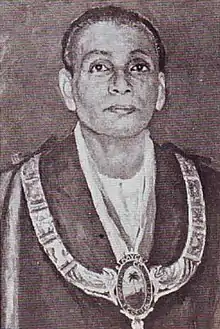Ratnasothy Saravanamuttu
Sir Ratnasothy Saravanamuttu (Tamil: இரத்தினசோதி சரவணமுத்து; born October 1886) was a Ceylon Tamil physician, politician and the first Mayor of Colombo.
Ratnasothy Saravanamuttu | |
|---|---|
இரத்தினசோதி சரவணமுத்து | |
 | |
| Member of the State Council of Ceylon for Colombo North | |
| In office 1931–1931 | |
| Succeeded by | Naysum Saravanamuttu |
| 1st Mayor of Colombo | |
| In office May 1937 – December 1937 | |
| Succeeded by | V. R. Schockman |
| In office January 1941 – December 1942 | |
| Preceded by | A. E. Goonesinghe |
| Succeeded by | George R. de Silvs |
| Member of Colombo Municipal Council | |
| In office 1937–1946 | |
| Personal details | |
| Born | October 1886 |
| Spouse | Naysum Saravanamuttu |
| Children | 4 |
| Alma mater | University of Madras |
| Profession | Physician, politician |
| Ethnicity | Ceylon Tamil |
Early life and family
Saravanamuttu was born in October 1886.[1] He was the son of Vetharniam Saravanamuttu, a physician from Colombo in Ceylon.[2] His mother's family were from Vaddukoddai in northern Ceylon.[3] His paternal grandfather Vetharniam is reputed to be the founder of Chunnakam, a small town in northern Ceylon.[4] Saravanamuttu had five eminent brothers: Nanasothy, Tharmasothy, Paikiasothy, Manicasothy and Saptaranajyoti.[2] He was educated at S. Thomas' College, Mount Lavinia where he won many prizes.[1][2][4] He earned a Bachelor of Medicine, Master of Surgery degree (M.B.C.M.) from the University of Madras.[1][2] He then went to England where he obtained M.R.C.S. and Licentiate of the Royal College of Physicians (L.R.C.P.) qualifications.[2]
Saravanamuttu married Naysum.[2] They had two daughters (Seetha and Chandra) and two sons (Vetharaniam and Ratnakumar).
Career
After returning to Ceylon Saravanamuttu established a dispensary in northern Colombo which soon grew to become a large medical centre.[2]
Saravanamuttu was a member of Colombo Municipal Council from May 1937 to December 1946.[5] He served as Mayor of Colombo from May 1937 to December 1937 and from January 1941 to December 1942.[6]
He contested the 1931 State Council election as a candidate in Colombo North and was elected to the State Council.[2][7] However, he was unseated after being found guilty of corrupt practices by an election Judge.[2][8] His wife, Naysum, was elected in the ensuing by-election, becoming the second female member of the State Council in 1931.[2][9]
He was a member of the Liberal League before founding the Independent Labour Party which was later absorbed by the Ceylon National Congress.[1][10] He played a major role in the relief following the Japanese bombing of Colombo in April 1942.[4]
Saravanamuttu received a knighthood as a Knight Bachelor for public services in the 1943 New Year Honours.[11]
References
- Maniccavasagar, Chelvatamby (24 February 2012). "Colombo Municipal Council's 147th anniversary". Daily News (Sri Lanka).
- Arumugam, S. (1997). Dictionary of Biography of the Tamils of Ceylon. pp. 181–182.
- "He gave of his best, but died a disillusioned man". The Sunday Times (Sri Lanka). 28 May 2000.
- Billimoria, Marc (13 August 2004). "The Saravanamuttu Prize at S. Thomas' College". Daily News (Sri Lanka).
- Hulugalle, H. A. J. (September 1965). Centenary Volume of the Colombo Municipal Council (1865 - 1965). Colombo Municipal Council . p. 60.
- Hulugalle, H. A. J. (September 1965). Centenary Volume of the Colombo Municipal Council (1865 - 1965). Colombo Municipal Council . p. 54.
- Dissanayake, T. D. S. A. (2002). "Chapter 1: Was early universal franchise a disaster?". War or Peace in Sri Lanka.
- LATEEF v. SARAVANAMUTTU.
- The Struggle for Equal Political Representation of Women in Sri Lanka
- Nissanka, Kamal (29 January 2012). "Liberal Party celebrates Silver Jubilee". Sunday Observer (Sri Lanka).
- "Second Supplement". The London Gazette: 2. 29 December 1942.